英语一般将来时
初中英语语法一般将来时

初中英语语法一般将来时【初中语法系列】一般将来时,结构是重点!一般将来时是初二英语要研究的内容,在初中整个语法系统中占非常重要的内容,也是历次考试的高频考点.1一般将来时的含义一般将来时表示将来某个时间要发生的动作或状态,或将来经常发生的动作或状态。
2一般将来时的基本结构1. will/shall+动词原形will在陈述句中用于各种人称;shall用于第一人称,常被will所代替。
否定式:will not=won'tshall not=shan't一般疑问式:will/shall+主语+动词原形+其他?特殊疑问式:特殊疑问词+一般疑问式?I will/shall do a better job next time.下次我要做得好些。
Oil and water will not mix.油和水没法混在一起。
—Will he help you with your English tonight?今天晚上他会帮助你研究英语吗?—Yes, he will./No, he won't.是的,他会。
/不,他不会。
—When will you arrive for America?你什么时候去美国?—Tomorrow.来日诰日。
2. am/is/are going to +动词原形否认式:am/is/are not going to +动词真相普通疑问式:am/is/are +主语+ going to +动词真相+其他?特殊疑问式:特殊疑问词+普通疑问式?He is going to spend his holidays in London.他打算在伦敦度假。
Look at the dark clouds. There is going to be a storm.看那乌云,快要下雨了。
Is he going to collect any data for us?他会帮我们搜集数据吗?What are you going to do tomorrow?明天你打算作什么?3will+动词原形与am/is/are going to +动词原形的用法区别will+动词原形与am/is/are going to +动词原形的用法虽然都表示将来发生动作或情况,一般情况下能互换。
英语语法—一般将来时态
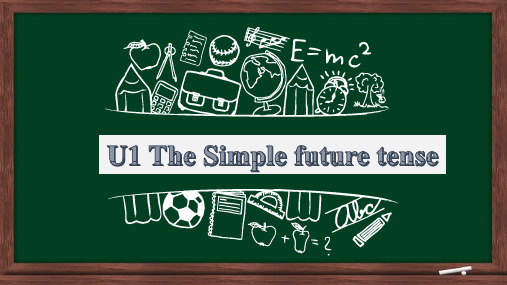
eg. My uncle is coming to see me tomorrow.
五、一般将来时特殊句式
1. There be 句式的一般将来时
Eg. There will be +其他 There is going to be+其他
2. 客观事实用一般现在
情态动词 (1)can/could:能够 could逾期 更委婉 (2)May/might 许可,准许 (3)Should 应该 主观义务
Have to 必须、不得不 (4)Must 主观必须,Must...?Yes,you must/no,you needn’t
Mustn’t 禁止 (5)Need 需要 Need...?Yes,you must/no,you needn’t
三、一般将来时 时间状语
Tomorrow、 Next week/month/year、 in+时间段、 this evening、 in the near future
四、一般将来时例句
1. 表示将来某个时间要发生的事 情或存在的状态。
eg.We will clean the room next week.
一、一般将来时用法(4)
1. 表示将来某个时间要发生的事 情或存在的状态。
3.条件、时间状语从句中,用一般 现在时表将来。
2. be going to 表示将要发生 或者打算、计划要做的事情,或者 可能发生的事情
4.go、come、leave、start等进行 时态表将来。
二、一般将来时结构 1. will / shall + 动词原形
Will / Shall +主语 + 动原 ?
小学英语一般将来时

汇报日期
What is Xi Yangyang going to do?
He is going to wash the clothes.
What is Lan Yangyang going to do?
He is going to swim.
单击此处添加正文,文字是您思想的提炼, 请尽量言简意赅的阐述观点。
B
B
B
( ) 4. There ________ a kite show in the zoo tomorrow evening. A. was B. is going to have C. will have D. is going to be
will eat
will eat
will play
will jump
will fly kites
be going to+动词原形 = will +动词原形
c
D
A
一、单项选择。 ( ) 1. There __________ a meeting tomorrow afternoon. A. will be going to B. will going to be C. is going to be D. will go to be ( ) 2. Charlie ________ here next month. A. isn’t working B. doesn’t working C. isn’t going to working D. won’t work ( ) 3. He ____ go to Zhaoqing this week. A. will B. is D. is going
否定形式:把be动词或will后面加nቤተ መጻሕፍቲ ባይዱt 例如:Jim is not going to play football. Jim will not play football. 一般疑问句:把be动词或will调到句首, 例如:Is Jim going to play football? Will Jim play football?
英语语法 什么是一般将来时

英语语法什么是一般将来时一般将来时(Simple Future Tense)是英语语法中用来表示将来发生的动作、事件或状态的一种时态。
它在句子中起着重要的作用,可以帮助我们准确描述未来的计划、意图或预测。
在这篇文章中,我将详细探讨一般将来时的用法和构造,以及一些常见的例子。
请注意,这是一个详细的讨论,所以文章会比较长。
让我们开始吧!一、一般将来时的构造一般将来时的构造非常简单,主要由助动词"will"或"shall"加上动词的原形构成。
下面是一些例子:1. I will go to the party tomorrow.我明天会去参加派对。
2. She will study abroad next year.她明年会出国留学。
3. They will visit their grandparents this weekend.他们这个周末会去看望他们的祖父母。
4. We shall meet at the park.我们将在公园见面。
5. He will not come to the meeting.他不会来参加会议。
6. Will you help me with my homework?你会帮我做作业吗?二、表示计划和意图一般将来时常常用来表示将来的计划、意图或打算。
下面是一些例子:1. We will have a meeting tomorrow.我们明天会开会。
2. She will start a new job next month.她下个月会开始一份新工作。
3. They will travel to Europe next summer.他们明年夏天会去欧洲旅行。
4. I will buy a new car next year.我明年会买辆新车。
5. He will learn to play the piano.他会学弹钢琴。
6. We shall visit our friends in the evening.我们晚上会去拜访我们的朋友。
一般将来时标志词结构

一般将来时标志词结构一般将来时是英语中一个非常常用的时态,其语态为主动语态,表示将要发生的动作或状态。
在句子中,一般将来时通常使用助动词will或shall加动词原形来构成。
除此之外,还有一些常用的标志词,它们在一般将来时中起着重要的连接作用,下面就让我们了解一下这些标志词的用法和特点。
1. tomorrow(明天)Tomorrow I will go to the park.(明天我将去公园。
)2. next week/month/year(下周/月/年)Next week I will start my new job.(下周我将开始我的新工作。
)3. in the future(将来)In the future, I will travel around the world.(将来,我将周游世界。
)4. soon(很快)He will be here soon.(他很快就会到这里。
)5. later(稍后)I will finish my work later.(我稍后会完成我的工作。
)6. at this time tomorrow(明天这个时候)At this time tomorrow, we will be on the train.(明天这个时候,我们将在火车上。
)7. by the end of(到……结束时)I will have finished this book by the end of the week.(到本周结束时,我会把这本书看完。
)通过学习这些标志词,我们可以更好地掌握一般将来时。
同时在实际运用时,我们也要注意使用标志词与助动词配合的语法结构,这样才能正确地表达自己的意思,让对方更好地理解。
初中英语 一般将来时课件(PPT18张)

Ⅳ.一般将来时的被动语态
一般将来时的被动语态表示“…将要被…”,其常用的表达形式有以下几种:
一般将来时被动语态:
will/shall + be /get done (表示意想不到的要发生的事情)
be going to be + done (表示按计划或安排发生的被动动作) be about to be + done (指将要发生的事情)
2.They ________ an English evening next Sunday. A. are having B. are going to have C. will having D. is going to have
3.—Tell him about the news when he _______, John.
考点2:考察一般将来时的不同表达方式
1.– Will his parents go to see the Terra Cotta Warriors tomorrow? – No, ________ (不去).
A. they willn’t. B. they won’t. C. they aren’t. D. they don’t.
基本结构:
1.主语+will/shall+do sth 2.主语+am/is/are+going to+do sth
3. 主表语示+位am移/is的/ar动e+词do可ing用s现th 在进行时表将来 4. 主特语定+时do间sth和条件状语从句可用一般将来时表将来
5.主语+am/is/are+(about)+to+do sth 注:之所以不用be是因为这是一般将来时,而be还包括过去式的 was、were
英语时态:一般将来时

英语时态:一般将来时一般将来时(simple future tense)表示将来某一时段的动作或状态,或将来某一段时间内经常的动作或状态。
一般将来时常常和表示将来的时间状语连用。
如:tomorrow, next week, in the future, in a year等。
Ⅰ. 句法结构【仅讨论陈述句和疑问句两种语式】:1.陈述句:A. 肯定形式:主语+be going to /will/shall +动词原形+其他B. 否定形式:主语+be not going to /will not/shall not+动词原形+其他注:a. 在直接在助动词后加not。
b. be going to结构中的be仅指am, is, are三个be动词。
c. will/shall+动原结构在谓语两态变化中无人称和数的变化。
d. 一般情况下,仅表示时态时,shall用于第一人称,will用于第二、三人称;表示说话人强烈意愿和语气时则用法相反。
2.疑问句:A. 一般疑问句:助动词提前即可①Be动词+主语+ going to +动词原形+其他②Will/Shall+主语+动词原形+其他B.特殊疑问句:特殊疑问词+一般疑问句(同上)3.被动语态:主语+ 助动词(结构) + be +动词过去分词【被动结构be done,时体现在助动词】➢两态变化例句参考下表(以will为例):Ⅰ. 主要用法及结构:1.【一般将来时表将来】一般将来时表示将要发生的动作或情况。
A.will/shall +动原I will(shall) arrive tomorrow.Will you be free tonight?B.be going to+动原a.表示计划、打算、准备做的事。
We are going to put up a building here.b.表示即将发生或肯定要发生的事。
I think it is going to snow.注:在一般将来时的句子中,有时有表示将来时间的状语,有时没有时间状语,这时要从意思上判断是否指未来的动作或情况。
一般将来时总结
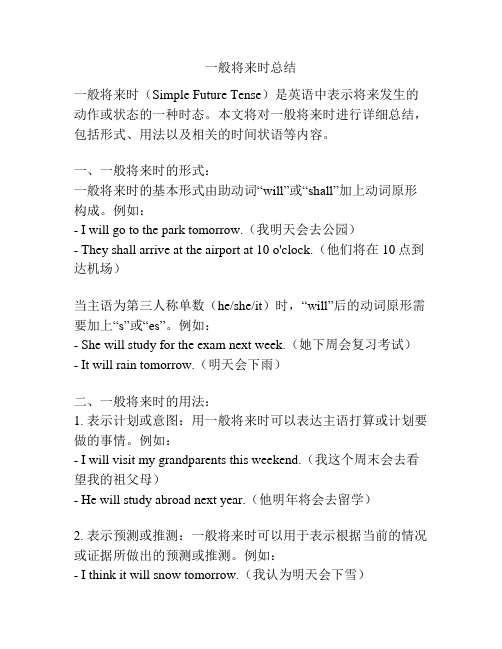
一般将来时总结一般将来时(Simple Future Tense)是英语中表示将来发生的动作或状态的一种时态。
本文将对一般将来时进行详细总结,包括形式、用法以及相关的时间状语等内容。
一、一般将来时的形式:一般将来时的基本形式由助动词“will”或“shall”加上动词原形构成。
例如:- I will go to the park tomorrow.(我明天会去公园)- They shall arrive at the airport at 10 o'clock.(他们将在10点到达机场)当主语为第三人称单数(he/she/it)时,“will”后的动词原形需要加上“s”或“es”。
例如:- She will study for the exam next week.(她下周会复习考试)- It will rain tomorrow.(明天会下雨)二、一般将来时的用法:1. 表示计划或意图:用一般将来时可以表达主语打算或计划要做的事情。
例如:- I will visit my grandparents this weekend.(我这个周末会去看望我的祖父母)- He will study abroad next year.(他明年将会去留学)2. 表示预测或推测:一般将来时可以用于表示根据当前的情况或证据所做出的预测或推测。
例如:- I think it will snow tomorrow.(我认为明天会下雪)- They believe she will win the competition.(他们相信她会赢得比赛)3. 表示意愿或允诺:一般将来时可以表达主语的意愿或承诺要做某事。
例如:- I will help you with your homework.(我会帮你做作业)- He will stop smoking.(他将戒烟)4. 表示预定的事件或安排的计划:一般将来时可以用于表示已经安排好的事件或计划。
一般将来时动词变化规则

一般将来时动词变化规则一般将来时是英语中表示将来发生的动作或状态的时态。
在一般将来时中,动词的变化规则是非常重要的,因为它们决定了动词在不同人称和数上的变化形式。
在本文中,我们将讨论一般将来时动词的变化规则,以便帮助读者更好地掌握这一时态。
首先,让我们来看一般将来时动词在不同人称和数上的变化规则。
在一般将来时中,动词的变化规则如下:1. 对于大多数动词,一般将来时的肯定句形式是由助动词“will”加上动词原形构成的。
例如:I will go to the party tomorrow.(我明天会去参加聚会。
)He will study for the exam next week.(他下周会为考试而学习。
)2. 对于第三人称单数形式的主语,动词的变化规则是在动词原形后加上“-s”或“-es”。
例如:She will watch a movie tonight.(她今晚会看电影。
)The sun will shine tomorrow.(明天太阳会照耀。
)3. 在一般将来时的否定句和疑问句中,助动词“will”需要与“not”或主语进行缩写。
例如:I will not go to the party tomorrow.(我明天不会去参加聚会。
)Will you study for the exam next week?(你下周会为考试而学习吗?)除了以上的变化规则外,一般将来时中还有一些特殊动词的变化形式需要注意。
例如,be动词的一般将来时形式为“will be”,have动词的一般将来时形式为“will have”,而情态动词的一般将来时形式为“情态动词+动词原形”。
另外,一些不规则动词在一般将来时中的变化形式也需要特别记忆和掌握。
总之,一般将来时动词的变化规则是学习英语时态的重要内容之一。
掌握这些规则可以帮助我们正确地运用一般将来时,使我们的英语表达更加准确和流利。
因此,希望读者能够通过本文对一般将来时动词的变化规则有更清晰的认识,并在日常学习和交流中灵活运用这些规则。
一般将来时一般现在时的句型结构

一般将来时一般现在时的句型结构
一般将来时(Future Simple Tense)和一般现在时(Present Simple Tense)是英
语语法中常用的两种时态。
它们在句型结构上有一些差异。
一般将来时主要用来表达将来发生的动作或事件。
其句型结构为主语 + will +
动词原形。
例如:“I will go to the movies tomorrow.”(我明天会去电影院。
)在这
个句子中,动作“去电影院”将在将来的某个时刻发生,因此我们使用了一般将来时的句型结构。
而一般现在时则用来描述经常发生的动作、存在的状态或普遍事实。
其句型结
构为主语 + 动词原形(第三人称单数需要加-s)。
例如:“He eats breakfast every morning.”(他每天早上吃早餐。
)这个句子中描述了一个经常发生的动作“吃早餐”,所以我们使用了一般现在时的句型结构。
总结一下,一般将来时的句型结构为主语 + will + 动词原形,用来描述将来发
生的动作或事件。
而一般现在时的句型结构为主语 + 动词原形(第三人称单数加-s),用来描述经常发生的动作、存在的状态或普遍事实。
然而,请注意,每个时态句型的使用都要根据具体语境进行,不同的表述方式
能够传达出不同的意思。
因此,在实际运用时,我们需要结合其他语法规则和词汇来构建完整的句子。
完整)初中英语一般将来时
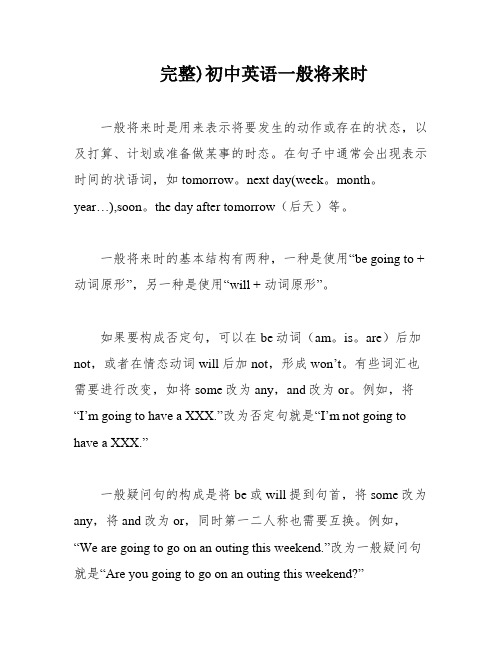
完整)初中英语一般将来时一般将来时是用来表示将要发生的动作或存在的状态,以及打算、计划或准备做某事的时态。
在句子中通常会出现表示时间的状语词,如tomorrow。
next day(week。
month。
year…),soon。
the day after tomorrow(后天)等。
一般将来时的基本结构有两种,一种是使用“be going to + 动词原形”,另一种是使用“will + 动词原形”。
如果要构成否定句,可以在be动词(am。
is。
are)后加not,或者在情态动词will后加not,形成won’t。
有些词汇也需要进行改变,如将some改为any,and改为or。
例如,将“I’m going to have a XXX.”改为否定句就是“I’m not going to have a XXX.”一般疑问句的构成是将be或will提到句首,将some改为any,将and改为or,同时第一二人称也需要互换。
例如,“We are going to go on an outing this weekend.”改为一般疑问句就是“Are you going to go on an outing this weekend?”对于划线部分的提问,一般将来时的对划线部分有三种情况。
第一种是问人,可以使用Who,例如“I’m going to New York soon.”改为问句就是“Who’s going to New York soon?”第二种是问干什么,可以使用What … do,例如“My father is going to watch a race with me this after noon.”改为问句就是“What is your father going to do with you this afternoon?”第三种是问什么时候,可以使用When,例如“She’s going to go to bed at nine.”改为问句就是“When is she going to bed?”同义句的构成是将be going to改为will,例如“I am going to go XXX.”可以改为“I will go XXX.”最基本的一般将来时结构是使用“will + 动词原形”,例如“XXX.”表示明天他们将要参观博物馆。
英语一般将来时的用法

英语一般将来时的用法英语一般将来时(Simple Future Tense)表示将要发生的动作或状态。
它通常用于描述在未来某个时间会发生的事件、计划、安排或预测。
以下是一般将来时的用法:1. 使用助动词will + 动词原形:这是构成一般将来时的基本结构。
例如:- I will go to the gym tomorrow.(我明天会去健身房。
)- They will visit their grandparents next week.(他们下周会去看望他们的祖父母。
)2. 在口语中,will有时可以缩写为'll,特别是在美国英语中。
例如:- She'll call me later tonight.(她今晚晚些时候会给我打电话。
)- We'll have a party for his birthday.(我们会为他的生日举办一个派对。
)3. 在疑问句和否定句中,将will提前到主语之前。
例如:- Will you come to the meeting tomorrow?(你明天会来参加会议吗?)- They will not be able to attend the concert.(他们不能参加音乐会。
)4. 表示习惯性动作的未来时,可以使用be going to + 动词原形。
例如:- He is going to play basketball after work every day.(他每天下班后都会打篮球。
)- She is going to study abroad next year.(她明年打算出国留学。
)5. 表示按计划或安排将要发生的事情,可以使用现在进行时。
例如:- The train is leaving at 6 pm.(火车将在下午6点离开。
)- The concert starts in an hour.(音乐会一小时后开始。
)6. 表示预测或推测未来可能发生的情况,可以使用情态动词may, might, could, should, must等。
英语语法 一般将来时

•
There won’t be only one country.
• 一般疑问句:Will+there+名词+其他成份?
•
Will there be only one country?
•
Yes, there will. / No, there won’t.
What can you see in this picture?
shall Will people still use paper money in 100 years?
(2) 用在状语从句中用一般现在时代ቤተ መጻሕፍቲ ባይዱ将来时。
否定式:shall not = shan’t 表示安排、命令或预定要做的事情。
In three days.
The plane takes off at 10:10.
The plane takes off at 10:10. That is, it’s leaving in ten minutes.
(2) 用在状语从句中用一般现在时代替 将来时。
If you do that again, I’ll hit you.
We will have a trip if it is sunny tomorrow.
• “There be”句型的一般将来时
• 肯 定 句:There will be +名词+其他成份.意 为“将会有……”
• 注意:无论后面加单数名词或复数形式,be都 必须用原形。
•
There will be only one country.
• 否 定 句:There won’t+名词+其他成份.
上一页
时态:一般将来时
英语语法之一般将来时

4)shall not 的缩写形式为shan’t; will not的缩 写形式为won’t. They’ll take part in the sports meet next week. 下周他们将参加运动会。 She won’t accept my suggestion. 她不接受我的建议。 5)be going to和will在含义和用法上略有不同。 be going to往往表示事先经过考虑的打算;will多 表示意愿、决心。有时不能互换。 比如:I have bought some books and I am going to learn Korean by myself. 我买了些书,我要自学韩语。(不能用will换)
Grammar
一般将来时
一般将来时表示将要发生的动作或存在的状态, 将来打算做的事情。
ห้องสมุดไป่ตู้
一般将来时的构成:
1.主语+be going to+动词原形 I’m going to paint it pink. 2.主语+shall/will+动词原形 I will miss him.
小学英语语法之一般将来时
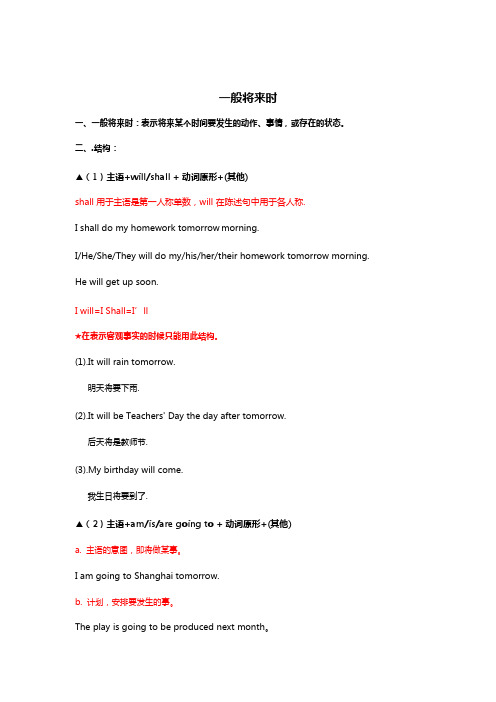
一般将来时一、一般将来时:表示将来某个时间要发生的动作、事情,或存在的状态。
二、.结构:▲(1)主语+will/shall + 动词原形+(其他)shall 用于主语是第一人称单数,will 在陈述句中用于各人称.I shall do my homework tomorrow morning.I/He/She/They will do my/his/her/their homework tomorrow morning. He will get up soon.I will=I Shall=I’ll★在表示客观事实的时候只能用此结构。
(1).It will rain tomorrow.明天将要下雨.(2).It will be Teachers' Day the day after tomorrow.后天将是教师节.(3).My birthday will come.我生日将要到了.▲(2)主语+am/is/are going to + 动词原形+(其他)a.主语的意图,即将做某事。
I am going to Shanghai tomorrow.b.计划,安排要发生的事。
The play is going to be produced next month。
c.有迹象要发生的事。
Look at the dark clouds, there is going to be a storm.(3)主语+be +to+动词原形+(其他),表示按计划要发生的事或征求对方意见。
We are to discuss the report next S aturday.(4)主语+am/is/are about to +动词原形,意为马上做某事。
He is about to leave for Beijing.(5)主语+be+v-ing,表示将来,表示按计划即将发生的动作,这类动词有 go, come,start,move,sail,leave,arrive,stay,live,fly。
一般将来时定义,结构,标志词,用法,变化规则
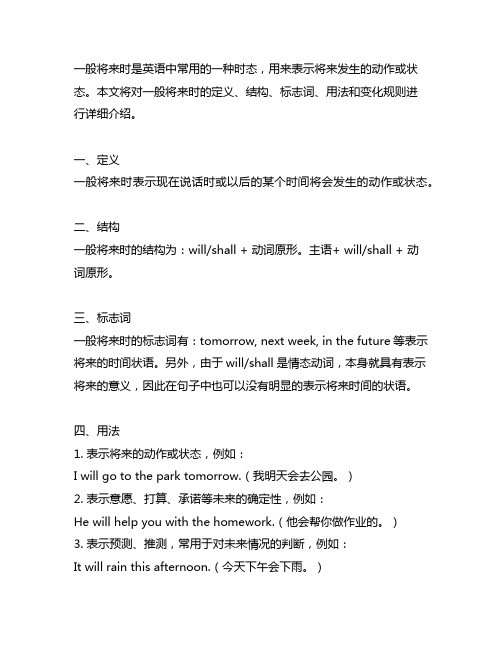
一般将来时是英语中常用的一种时态,用来表示将来发生的动作或状态。
本文将对一般将来时的定义、结构、标志词、用法和变化规则进行详细介绍。
一、定义一般将来时表示现在说话时或以后的某个时间将会发生的动作或状态。
二、结构一般将来时的结构为:will/shall + 动词原形。
主语+ will/shall + 动词原形。
三、标志词一般将来时的标志词有:tomorrow, next week, in the future等表示将来的时间状语。
另外,由于will/shall是情态动词,本身就具有表示将来的意义,因此在句子中也可以没有明显的表示将来时间的状语。
四、用法1. 表示将来的动作或状态,例如:I will go to the park tomorrow.(我明天会去公园。
)2. 表示意愿、打算、承诺等未来的确定性,例如:He will help you with the homework.(他会帮你做作业的。
)3. 表示预测、推测,常用于对未来情况的判断,例如:It will rain this afternoon.(今天下午会下雨。
)五、变化规则1. 肯定句的一般将来时结构为:will/shall + 动词原形。
例如:She wille to see me tomorrow.(她明天会来看我。
)2. 否定句的一般将来时结构为:will/shall + not + 动词原形。
例如:I will not go to the party tonight.(我今晚不会去参加派对。
)3. 疑问句的一般将来时结构为:will/shall + 主语+ 动词原形。
例如:Will youe to the meeting tomorrow?(你明天会来参加会议吗?)以上就是关于一般将来时的定义、结构、标志词、用法和变化规则的详细介绍。
希望对您有所帮助。
一般将来时是英语中最常用的一种时态之一,用于表示将来会发生的动作或状态。
英语一般将来时的五种表达方法
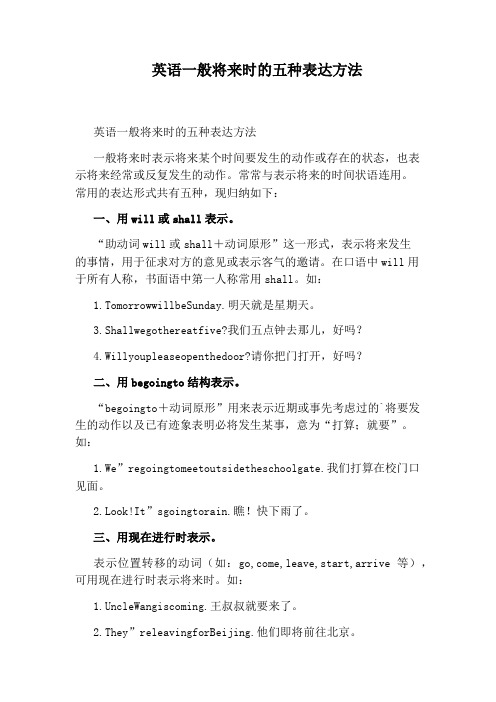
英语一般将来时的五种表达方法英语一般将来时的五种表达方法一般将来时表示将来某个时间要发生的动作或存在的状态,也表示将来经常或反复发生的动作。
常常与表示将来的时间状语连用。
常用的表达形式共有五种,现归纳如下:一、用will或shall表示。
“助动词will或shall+动词原形”这一形式,表示将来发生的事情,用于征求对方的意见或表示客气的邀请。
在口语中will用于所有人称,书面语中第一人称常用shall。
如:1.TomorrowwillbeSunday.明天就是星期天。
3.Shallwegothereatfive?我们五点钟去那儿,好吗?4.Willyoupleaseopenthedoor?请你把门打开,好吗?二、用begoingto结构表示。
“begoingto+动词原形”用来表示近期或事先考虑过的`将要发生的动作以及已有迹象表明必将发生某事,意为“打算;就要”。
如:1.We”regoingtomeetoutsidetheschoolgate.我们打算在校门口见面。
2.Look!It”sgoingtorain.瞧!快下雨了。
三、用现在进行时表示。
表示位置转移的动词(如:go,come,leave,start,arrive等),可用现在进行时表示将来时。
如:1.UncleWangiscoming.王叔叔就要来了。
2.They”releavingforBeijing.他们即将前往北京。
四、用一般现在时表示。
根据规定或时间表预计要发生的动作,在时间和条件状语从句中,都可用一般现在时表示将来时。
如:1.Thenewtermstarts(begins)onAugust29th.新学期八月二十九日开学。
2.Ifitdoesn”traintomorrow,we willgooutforapicnic.如果明天不下雨,我们将出去野餐。
五、用“be+动词不定式”或用“beaboutto+动词原形”的结构表示。
如:1.HeistovisitJapannextyear.明年他将访问日本。
英语语法一般将来时解析

否定句
I will not say= I won’t /wכnt/ say You will not see= You won’t see He will not think= He won’t think She will not talk= She won’t talk It will run 改否定句 … They’ll chat改否定句 … We’ll make改否定句 …
4、下周,我们要去苏州。
We will go to Suzhou next week.
5、她和她的母亲将在六月见面。
She will meet her mother in June.
6、Simon十分钟后将干什么?他将帮助妈 妈打扫房间。
What is Simon going to do ten minutes later? He’s going to help his mother clean the room
一般将来时
一、一般将来时的意义:
用来描述一个即将要发生的动作;谈 论未来的计划和打算。
二、一般将来时的基本结构:
will/shall+动词原形 be going to+动词原形
三、常见时间状语:
next Tuesday
tomorrow
next week
tonight
the coming Sunday in a few minutes
1、明天他将教我英语。
He’ll teach me English tomorrow.
2、他们下个星期带我们去他的花园。
They will take us to his garden next week.
3、将来,我要成为一个司机。
- 1、下载文档前请自行甄别文档内容的完整性,平台不提供额外的编辑、内容补充、找答案等附加服务。
- 2、"仅部分预览"的文档,不可在线预览部分如存在完整性等问题,可反馈申请退款(可完整预览的文档不适用该条件!)。
- 3、如文档侵犯您的权益,请联系客服反馈,我们会尽快为您处理(人工客服工作时间:9:00-18:30)。
HEART LINE:
Marked line: Lucky in love! Happy relationships.
Weak line: Unlucky in love/ Unloyalty
THE HEAD LINE
Curve – Marked line: Brilliant memory/ creativity/ Unrealistic Straigth- Weak line: Bad Memory/ Poor concentration/ Realistic
•
you / learn / Irish
–
Positive:
–
Negative:
–
Question:
•
she / buy / a computer
–
Positive:
–
Negative:
–
Question:
•
we / take / the bus
–
Positive:
–
Negative:
–
Question:
THE LIFE LINE
Large and marked line: Good health / Energy /Power Weak line: A lot of illness/ weak personality…
The Anabella’s Future
Anabella is a princess. She wants to know what will happen to her in the future, so she goes to
6) I _____Dennis tonight. (not/to see)
7) __Alexander_____ the next bus? (to take)
8) They_______ football in the gym. (not/to play)
9) When ___ you_______ me the book back? (to give)
•
she / watch / the match
–
Positive:
–
Negative:
–
Question:
•
they / wait / in the park
–
Positive:
–
Negative:
–
Question:
•
He / buy / bread / this afternoon
–
Positive:
Did you call Sue? No, I forgot it.
I will call her tonight
Decisions at the time of speaking
I am little hungry. I think I will have a sandwich. I don’t think I will go out tonight. I am too tired.
before to find the right one.
Exercise 2.
• Put the verbs into the correct form (future I). Use going to.
• It (rain) . • They (eat) stew. • I (wear) blue shoes tonight. • We (not / help) you. • Jack (not / walk) home. • (cook / you) dinner? • Sue (share / not) her biscuits. • (leave / they) the house? • (take part / she) in the contest? • I (not / spend) my holiday abroad this year.
IS GOING TO HAPPEN: The situation now make us believe that.
Look at those black clouds! It’s going to rain.
She is pregnant. She is going to have a baby.
visit a fortune teller.
D:Can you see my future?
FT: I certainly can.
D: Tell me about it!
FT: You will marry a rich prince.
D: Auch! Can you see him?
Is he handsome?
3) Dad, can you do this for me? - I’m sorry. Ask Mum. She will do it for you.
4) Why have you got so many eggs? -Because I am going to make an omelette. 5) I haven’t got enough money to get home. - I will lend you some, if you like. How much do you need?
FT: Well … Not when you first meet him…He looks like a frog!
P: A frog?
F: Yes…Some day you will meet a frog! And you will kiss it.
P: I will not!
F: Yes, you will and it will turn to a handsome prince! FT: What are you doing?
–
Negative:
–
Question:
Exercise 4.
Put the verbs in brackets into the gaps. Use the going to-future. Watch the punctuation and form sentences or questions. Example: ___ they __________ a football for Peter? (to buy) Answer: Are they going to buy a football for Peter?
PREDICTIONS WITH PRESENT EVIDENCE
WILL
➢I left the door open. I will close it right now.
(In the restaurant) W :What would you like to drink?
➢I will have a cup of coffee, please.
10) Angela_______________ a week in Japan. (to spend)
1) She ____ to the stadium. (not/to walk) 2) __you____ to London? (to fly)
3) John____ anything. (not/to eat)
4) ____she____ at a campsite? (to stay)
5) What___ you____ tomorrow? (tห้องสมุดไป่ตู้ do)
Personal opinion
Don’t worry. I will help you with your homework.
I will love you forever.
You will be rich
Offers Promises Predictions
Exercise 1.- Choose the correct form of the verb.
P: I’m not going to listen to any more! I’m going back to the palace!
FT: You can’t change the future my dear…
(When Anabella returns to the palace…)
FT: Oh!! My dear, you will have to kiss a lot of frogs
1) Why are you working so hard these days? (buy)
- Because I’m going to buy a car , so I’m saving as much as I can
2) What are you going to buy Jill for her birthday? (buy) - A CD. -Mmm, but she hasn’t got a CD player. - In that case, I will buy her a book.
Exercise 3.
•
Write sentences in going to future.
•
he / get up / early
–
Positive:
–
Negative:
–
Question:
•
they / do / their best
–
Positive:
–
Negative:
–
Question:
Katie
BE GOING TO AND
WILL FUTURE
I AM GOING TO : I HAVE DECIDED TO DO STH.
